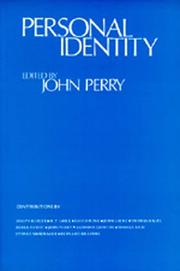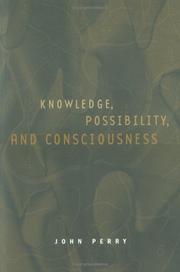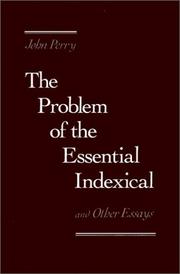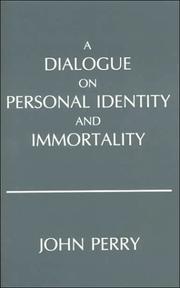| Listing 1 - 10 of 158 | << page >> |
Sort by
|

ISBN: 1575861984 Year: 1999 Publisher: Stanford, Calif. Center for the Study of Language and Information
Abstract | Keywords | Export | Availability | Bookmark
 Loading...
Loading...Choose an application
- Reference Manager
- EndNote
- RefWorks (Direct export to RefWorks)
Philosophy of language --- Meaning (Philosophy) --- Belief and doubt. --- Signification (Philosophie) --- Croyance et doute

ISBN: 1575862697 1575862468 9781575862460 9781575862699 Year: 2000 Publisher: Stanford, Calif. Center for the Study of Language and Information
Abstract | Keywords | Export | Availability | Bookmark
 Loading...
Loading...Choose an application
- Reference Manager
- EndNote
- RefWorks (Direct export to RefWorks)
Philosophy of language --- Meaning (Philosophy) --- Belief and doubt.

ISBN: 1575863103 157586309X 9781575863092 9781575863108 Year: 2001 Publisher: Stanford (Calif.): CSLI
Abstract | Keywords | Export | Availability | Bookmark
 Loading...
Loading...Choose an application
- Reference Manager
- EndNote
- RefWorks (Direct export to RefWorks)
Philosophy of language --- Meaning (Philosophy) --- Reference (Philosophy) --- Reflection (Philosophy) --- Semantics (Philosophy) --- Intension (Philosophy) --- Logical semantics --- Semantics (Logic) --- Semeiotics --- Significs --- Syntactics --- Unified science --- Referring, Theory of --- Theory of referring --- Language and languages --- Logic, Symbolic and mathematical --- Logical positivism --- Meaning (Psychology) --- Philosophy, Modern --- Semiotics --- Signs and symbols --- Symbolism --- Analysis (Philosophy) --- Definition (Philosophy) --- Philosophy

ISBN: 0520029607 9780520029606 Year: 1975 Volume: 2 147 Publisher: Berkeley University of California press
Abstract | Keywords | Export | Availability | Bookmark
 Loading...
Loading...Choose an application
- Reference Manager
- EndNote
- RefWorks (Direct export to RefWorks)
Philosophical anthropology --- Personality. --- Identity (Philosophical concept) --- Philosophy of mind --- Personnalité --- Identité --- Philosophie de l'esprit --- Personnalité --- Identité
Book
ISBN: 9782746733411 2746733412 Year: 2012 Publisher: Paris : Ed. Autrement,
Abstract | Keywords | Export | Availability | Bookmark
 Loading...
Loading...Choose an application
- Reference Manager
- EndNote
- RefWorks (Direct export to RefWorks)
Procrastination. --- Time management. --- Self-actualization (Psychology). --- Procrastination --- Budgets temps --- Actualisation de soi

ISBN: 9780262661355 0262161990 0262661357 0262281414 1423726626 9780262281416 9780262161992 Year: 2001 Volume: 1999 Publisher: Cambridge, Mass. MIT
Abstract | Keywords | Export | Availability | Bookmark
 Loading...
Loading...Choose an application
- Reference Manager
- EndNote
- RefWorks (Direct export to RefWorks)
Physicalism is the idea that if everything that goes on in the universe is physical, our consciousness and feelings must also be physical. Ever since Descartes formulated the mind-body problem, a long line of philosophers has found the physicalist view to be preposterous. According to John Perry, the history of the mind-body problem is, in part, the slow victory of physical monism over various forms of dualism. Each new version of dualism claims that surely something more is going on with us than the merely physical.In this book Perry defends a view that he calls antecedent physicalism. He takes on each of three major arguments against physicalism, showing that they pose no threat to antecedent physicalism. These arguments are the zombie argument (that there is a possible world inhabited by beings that are physically indiscernible from us but not conscious), the knowledge argument (that we can know facts about our own feelings that are not just physical facts, thereby proving physicalism false), and the modal argument (that the identity of sensation and brain state is contingent, but since there is no such thing as contingent identity, sensations are not brain states).
Theory of knowledge --- Knowledge, Theory of --- Philosophy of mind --- Consciousness --- Philosophy --- Philosophy & Religion --- Speculative Philosophy --- Epistemology --- Psychology --- Materialism --- Knowledge, Theory of. --- COGNITIVE SCIENCES/General --- PHILOSOPHY/Philosophy of Mind/General

ISBN: 0195049993 Year: 1993 Publisher: New York (N.Y.): Oxford university press
Abstract | Keywords | Export | Availability | Bookmark
 Loading...
Loading...Choose an application
- Reference Manager
- EndNote
- RefWorks (Direct export to RefWorks)
Belief and doubt. --- Meaning (Philosophy). --- Signification (philosophie) --- Doute --- Meaning (Philosophy) --- Philosophy of language --- Belief and doubt --- Philosophy --- Semantics (Philosophy) --- Conviction --- Doubt --- Consciousness --- Credulity --- Emotions --- Knowledge, Theory of --- Psychology --- Religion --- Will --- Agnosticism --- Rationalism --- Skepticism --- Doute.

ISBN: 0915144530 Year: 1981 Publisher: Indianapolis (Ind.): Hackett
Abstract | Keywords | Export | Availability | Bookmark
 Loading...
Loading...Choose an application
- Reference Manager
- EndNote
- RefWorks (Direct export to RefWorks)
Personality. --- Identity (Philosophical concept). --- Immortality (Philosophy). --- Personnalité --- Identité --- Immortalité (Philosophie) --- Identity (Psychology) --- Immortality (Philosophy) --- Personality --- Personal identity --- Personality psychology --- Personality theory --- Personality traits --- Personology --- Traits, Personality --- Psychology --- Individuality --- Persons --- Self --- Temperament --- Philosophy --- Ego (Psychology)

ISBN: 9780872205215 0872205207 0872205215 Year: 2002 Publisher: Indianapolis (Ind.): Hackett
Abstract | Keywords | Export | Availability | Bookmark
 Loading...
Loading...Choose an application
- Reference Manager
- EndNote
- RefWorks (Direct export to RefWorks)
Philosophical anthropology. --- Identity (Philosophical concept) --- Self (Philosophy) --- Anthropologie philosophique --- Identité --- Moi (Philosophie) --- Philosophical anthropology --- Philosophy --- Anthropology, Philosophical --- Man (Philosophy) --- Civilization --- Life --- Ontology --- Humanism --- Persons --- Philosophy of mind --- Identity --- Comparison (Philosophy) --- Resemblance (Philosophy)

ISBN: 128044004X 0195364155 1423763734 9781423763734 9786610440047 6610440042 0195049993 9780195049992 0197731384 Year: 1993 Publisher: New York : Oxford University Press,
Abstract | Keywords | Export | Availability | Bookmark
 Loading...
Loading...Choose an application
- Reference Manager
- EndNote
- RefWorks (Direct export to RefWorks)
This is a collection of essays that discusses aspects of the author's views on the philosophy of language and the philosophy of mind. He discusses problems related to ""self-locating beliefs"" - the sorts of beliefs one expresses with indexicals and demonstratives like ""I"" and ""this"".
Belief and doubt. --- Meaning (Philosophy) --- Philosophy --- Semantics (Philosophy) --- Conviction --- Doubt --- Consciousness --- Credulity --- Emotions --- Knowledge, Theory of --- Psychology --- Religion --- Will --- Agnosticism --- Rationalism --- Skepticism --- Self-locating beliefs --- Demonstratives
| Listing 1 - 10 of 158 | << page >> |
Sort by
|

 Search
Search Feedback
Feedback About UniCat
About UniCat  Help
Help News
News